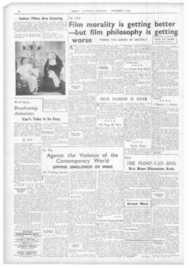Page 5, 9th September 1938
Page 5

Report an error
Noticed an error on this page?If you've noticed an error in this article please click here to report it.
Tags
Share
Related articles
The Home And The Worker —n
"hitler" Youth In England?
New Order Will Depend Onl Right Relationship Between...
.4.0 'from, Page - .one
For Better Homes Train • Courting Coup1esli..f..7.79 And...
THE HOME AND THE WORKER
By Father Eugene Langdale
THE fundamental truth that the moral strength of a nation is measured by
the vigour of its family life is one so obvious that it hardly needs to be stressed. And since, in an industrial country like England, the majority of our people are divorced from the soil and belong to the proletarian working classes, the future moral decay or prosperity of England, and therefore the prospects we have of bringing back our country to the Catholic faith, are in very large measure dependent on the hold that the idea of the home and of family life will maintain over the workers.
The Prolific Workman
It has become commonplace to say that family life is slowly decaying in this country. It cannot he denied that there are evident signs of decay; hut they are less apparent among the workers than in any other class of society.
This is perhaps astonishing when we reflect on the disruptive effect which the economic philosophy of the Manchester School, supreme in England for nearly a century, must necessarily have over the institution of the family in the working classes. Yet in spite of this, and perhaps indeed on account of this, the English worker has clung to the ideal of the family, as the one stable institution in which he could find refuge from the onslaughts of economic and social individualism.
The religious factor has also had a strong influence. The English working man, though his religious beliefs may be of a rather nebulous kind, has always retained a deep respect for the fundamentals of Christianity and its moral code; he has not been affected, to the same degree as the working man of the Continent. by the dissolving influences of unbelief and anticlericalism. Nor has the law of England, at least until recent times, favoured the disruption of the family; the result of this may be seen by contrasting the number of divorces in the working classes of this
country with those of the industrial areas in, for example, Northern France,
—And Unemployment Yet these facts are no justification for optimism. lf the institution of the family, and a love and respect for family life, are still flourishing in the English working classes, and especially among Catholics, many economic and social evils are slowly sapping the very foundations of that primary unit of human society.
The first of these is undoubtedly unemployment.
It is only in comparatively recent years that we have come to consider an army of nearly one and a half million unemployed as something almost normal. Many wellmeaning and even praiseworthy attempts have been made to deal with this problem, yet we have to admit that it still remains unsolved, and is likely to remain so for many years.
But in the meantime incalculable harm is being done to family life, especially in those parts of the North of England which are the moral backbone of the country. And quite apart from their obvious economic repercussions, it is terrible to think of the destructive moral effects of long spells of unemployment. coupled with the Means Test, on the self-respect and authority of countless heads of family.
Working Mothers
A second factor, closely allied with the first, which is undermining family life among the workers, is the low rate of wages prevailing in many of our industries. This often means that the father's wages are insufficient to keep the family in any sort of decent comfort, so that the mother, whose place is obviously in the home, has to go out to work.
No one with any true appreciation of Catholic social philosophy can view this state of affairs with complacency; the Pope has called it " an intolerable abuse, to be abolished at all costs." This state of affairs can only be remedied when the community as a whole is convinced of the fact that one of the greatest social evils in England is the grossly unequal division of income, and steps are taken to bring about a more equitab' : distribution of wealth.
We Catholics can do a great deal to make this reform effective by insistence on the doctrine, which is by no means generally accepted today, that a family living wage is due in justice to every adult worker, and that wages are the first charge on every industry.
In this connection. Pius XI has praised " those who have most prudently and usefully attempted various methods by which an increased wage is paid in view of increased family burdens." We should be proud of the fact that it was a Catholic, M. Romanet, of the Joya Works in Besancon, who first introduced the ingenious yet simple mechanism which made family allowances possible.
In England we have been very slow in recognising their value, and it is very much to be honed that the useful articles of Mr. J. R. Kirwan in recent issues of the Christian Democrat will help to bring the idea of family allowances to the forefront of Catholic social policy in this country.
The Actual Home Housing is another problem of vital importance. It has sometimes been remarked that Catholics show a marked degree of enthusiasm for family life, yet show very little interest in housing schemes which might make family life really possible.
There is a certain amount of truth in this criticism, yet it is good to know that the fine work of the Women's Housing Advisory Council was largely due to the initiative of Catholics, and to realise that in many instances Catholics engaged in public service have been able to put (heir Catholic principles into practice in the promotion of housing schemes. Much good
work has been done, yet we are faced with the grave -problem which must necessarily arise owing to the preference shown by Public Authorities in the bigger towns for big blocks of flats instead of small houses.
One is sometimes tempted to think, perhaps unjustly, that what are euphemistically called " working-class " flats," with their high rents, their shoddiness, noise, and lack of privacy, are more destructive of family life than the slums they replace.
There are many practical ways in which Catholic Social Action can assist the worker in the problems connected with his home.
The Liverpool Scheme envisages the setting up of deanery or parochial bureaux to deal with them. This is a most excellent idea, and it has been in operation in France for many years. These bureaux, or "Secretariats of the People " as they are called, have met with conspicuous success and rendered great services. We certainly need something of the kind over here. Only recently I heard of a Catholic woman who could obtain the information she needed from the local offices of the Communist Party!
We have preferred to deal in the first place with a few of the many problems which face the worker in his home life, before coming to the practical means of sanctifying the Christian home. Grace does not destroy nature but perfects it, and material conditions play their part in hindering or promoting the spiritual life. But on the other hand, man does not live on bread alone; home life can only reach its full beauty and splendour when it is -permeated by Christian ideals. In our second article we shall ask ourselves what we must do in order to restore true Christian home life among the workers.
blog comments powered by Disqus

















